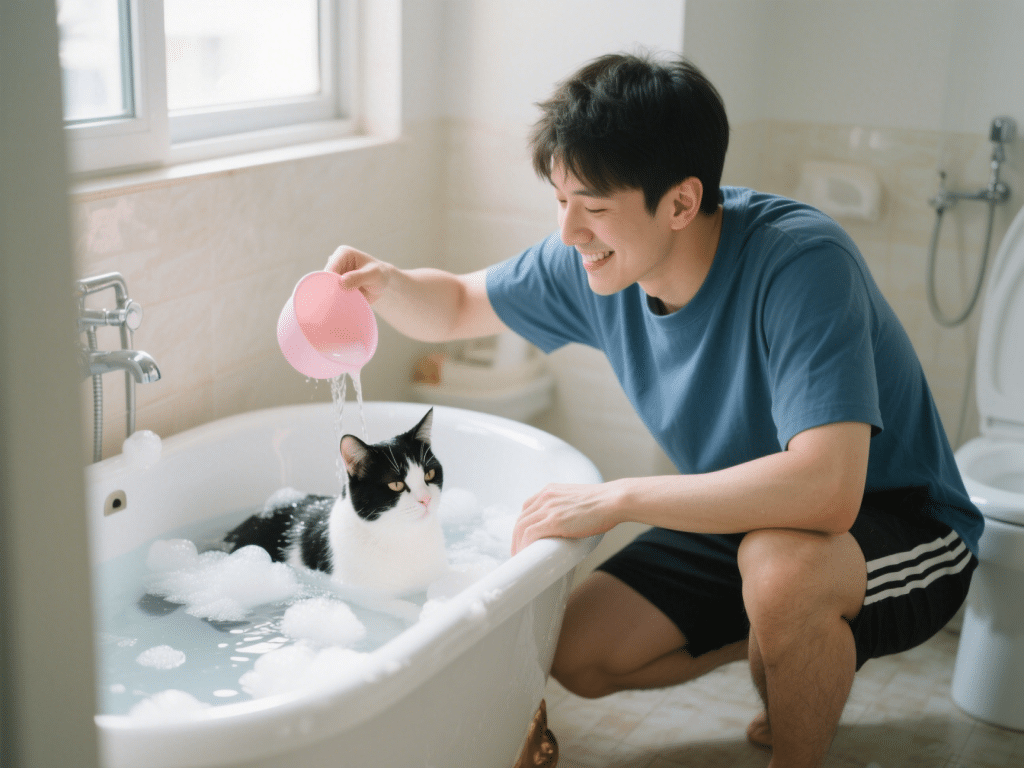Indoor Cat Deworming Myths Busted: What Every Owner Should Know
Introduction
Many cat owners assume indoor cats are immune to parasites, leading to skipped deworming treatments. However, indoor felines can still contract worms via insects, contaminated surfaces, or guests carrying parasites. This article dispels common myths about deworming indoor cats and provides science-based recommendations.
Myth 1: “Indoor Cats Don’t Need Deworming”
Fact: Indoor cats can ingest fleas carrying tapeworm cysts or accidentally consume parasite eggs from contaminated shoes or pet carriers.
Evidence: A 2019 veterinary study found that 15% of strictly indoor cats tested positive for intestinal parasites during routine fecal exams. Regular deworming prevents unexpected infections.
Myth 2: “Natural Remedies Alone Are Sufficient”
Fact: Ingredients like pumpkin seeds and diatomaceous earth may support gut health but lack clinical efficacy against established infections.
Recommended Approach: Use veterinarian-prescribed dewormers (e.g., pyrantel pamoate, praziquantel) as primary treatment; natural supplements can be adjunctive.
Myth 3: “Monthly Heartworm Preventive Covers All Parasites”
Fact: Heartworm medications containing milbemycin or selamectin do target certain intestinal parasites, but some products exclude tapeworms.
Clarification: Check product labels—if tapeworms are not covered, administer praziquantel or a combination dewormer biannually.
Myth 4: “Deworming Too Often Is Dangerous”
Fact: Overdosing on dewormers can cause toxicity, but following veterinary guidance prevents risks.
Safe Frequency:
Indoor cats: Every 3–6 months.
Flea-endemic environments: Every 1–2 months.
Myth 5: “No Signs Means No Parasites”
Fact: Many cats exhibit subclinical infections without diarrhea or weight loss.
Recommended Practice: Biannual fecal tests to detect asymptomatic parasite presence; early detection prevents complications.
Science-Based Deworming Protocol for Indoor Cats
Initial Veterinary Visit
Fecal exam and physical check.
Establish baseline parasite status.
Standard Deworming Schedule
0–6 Months: Deworm every 2 months with a broad-spectrum dewormer.
6–12 Months: Deworm every 3–4 months.
Adult (1+ Year): Deworm every 6 months; increase frequency if exposure risk rises.
Product Selection
Pyrantel Pamoate: Effective against roundworms and hookworms.
Praziquantel: Essential for tapeworm control.
Combined Topical Preventives: Selamectin (Revolution®) for fleas and some intestinal parasites.
Environmental Control
Maintain a clean litter box; scoop daily.
Regularly disinfect bedding and toys.
Conclusion
Indoor cats are not exempt from intestinal parasites. Debunking myths—such as infrequent deworming or sole reliance on natural remedies—ensures responsible owners adopt evidence-based parasite prevention. Regular veterinary consultations, fecal exams, and targeted treatments keep indoor cats healthy.
Explore Dogs

Veterinarian Tips: Deworming Pregnant Dogs Safely
IntroductionDeworming pregnant dogs is essential to protect the dam and her puppies from congenital ...
Read More
Best Dog Dewormers for Puppies: A Vet-Recommended Guide
IntroductionPuppies are particularly vulnerable to intestinal parasites—roundworms, hookworms, and...
Read More
Top Safe Deworming Methods for Indoor Cats: Effective Parasite Prevention
IntroductionIndoor cats are often perceived as less susceptible to parasites, but they can still con...
Read More
Clinic vs. At-Home Deworming for Cats: Making the Right Choice
Clinic vs. At-Home Deworming for Cats: Making the Right ChoiceChoosing between clinic-based and at-h...
Read More
Can You Cuddle a Cat Right After Deworming? Handling Tips for Owners
Can You Cuddle a Cat Right After Deworming? Handling Tips for OwnersDeworming is essential for your ...
Read More
How to Flea-Proof Your Home: 7 Proven Ways to Create a Parasite-Free Environment
How to Flea-Proof Your Home: 7 Proven Ways to Create a Parasite-Free EnvironmentFleas pose health ri...
Read More
Can You Bathe a Cat Before or After Deworming? Timing and Best Practices
Title: Can You Bathe a Cat Before or After Deworming? Timing and Best PracticesIntroductionBath...
Read More
Top 5 Cat Dewormers Compared: Vet-Approved Options for Internal and External Protection
Top 5 Cat Dewormers Compared: Vet-Approved Options for Internal and External ProtectionIntroductionI...
Read More
How Much Does Cat Deworming Cost? A Practical Guide with Recommended Products
How Much Does Cat Deworming Cost? A Practical Guide with Recommended Products?Cat deworming is a cru...
Read More